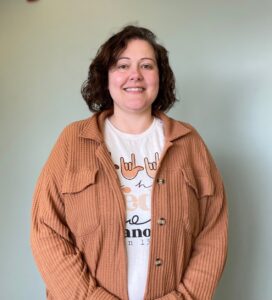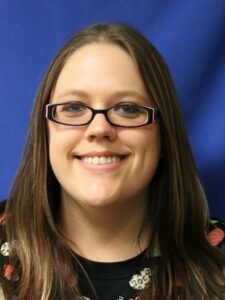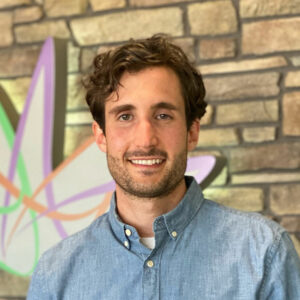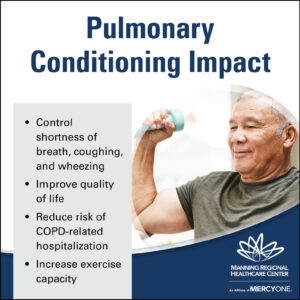 Emmalee Bolin works as a counselor at the Recovery Center at MRHC and shares that her personal experience with addiction and recovery is what inspires her to help others.
Emmalee Bolin works as a counselor at the Recovery Center at MRHC and shares that her personal experience with addiction and recovery is what inspires her to help others.
“I actually attended the Manning Recovery Center in 2014,” said Bolin, LBSW, CADC. “I gained so much knowledge and understanding through my own experiences as an addict that I wanted a career where I could help others who also struggle.”
Following her own journey to recovery, Bolin worked as a Parent Partner with the DHS Mentor Program for three years before becoming the coordinator. In 2017, she received her associate degree from DMACC and went on to Briar Cliff for her bachelor’s degree in social work. After moving to Templeton in 2020, she accepted a position at the MRHC Recovery Center, saying, “I couldn’t pass up the opportunity to work where it all started.”
“Emmalee is a hard worker, she is always willing to jump in and cover when something needs to be done, and she is the first to volunteer to learn something new or obtain an additional license,” said Recovery Center Director, Taya Vonnahme, MSN, RN, ARNP, CADC. “You always know when Emmalee is around because we can hear her laugh throughout the Recovery Center. She is a wonderful person to have here!”
Bolin works as a counselor at the Recovery Center, a role that consists of leading group therapy sessions and following up with her case load of inpatient and outpatient clients.
“We work on the root causes that brought them to using drugs and alcohol,” explained Bolin. “I get to connect with clients and give them a sense of hope that they can get and stay clean and sober too. If I can make an impact on one person and help others to consider there is a better way of life than living in active addiction, then all my effort is worth it. Coming from experience, I want to help people who are going through addiction and show them a new way. I am tangible evidence that recovery is possible.”
In addition to utilizing her personal experience with addiction to help Recovery Center clients, Bolin points out that the support from others also makes a big impact.
“We have such a good recovery community here that embraces the clients and really cares about them,” said Bolin. “Our rural community, although small, has welcoming, thriving, and active recovery members. We have speakers from the area and past clients who come to share their experience, strength, and hopes to current clients. If it wasn’t for the recovery community in the Manning area, I don’t think we would be such a highly regarded facility.”
Bolin also has a great support system at the Recovery Center to help her do her job to the best of her ability. “I truly feel like we have a good team atmosphere,” said Bolin. “We all communicate well and when something happens or a coworker is out, we take charge of what needs to be done for our clients. I feel like my coworkers are my family.”
While it is important for Bolin to work in a positive team environment, she also appreciates the way the recovery process is structured as well as how clients are treated in Manning.
“I feel like we truly treat clients with respect. The Recovery Center staff treats clients as human beings who have an illness, not as criminals,” Bolin said. “We provide them with outlets like recreation and outside 12-step meetings. Although our clients may have a past, we truly believe through staying clean and sober they can become better people in society.”
While Bolin’s goal for all her clients is to help them achieve lasting sobriety and leave the Recovery Center with the knowledge and tools to live healthy, drug-free lives, she has no intention of leaving any time soon and is ambitious about the future of her career.
“My goal is to eventually get my masters in social work,” Bolin shared. “I am a good leader and have always been in management throughout my years of employment. I would love to be the director of the Recovery Center one day.”To join the MRHC team, visit www.mrhcia.com/careers or call (712) 655-2072 for more information on current job openings.
Recovery Center Services
The Recovery Center is a 16-bed, co-ed chemical dependency facility located in Manning. Services include detoxification, residential treatment, outpatient treatment and consultations or evaluations. Recovery Center staff have adapted treatments to meet addiction issues from alcoholism to meth to the abuse of prescription painkillers. If you or someone you care about has problems with substance abuse, call (712) 655-2300. For more information, visit www.manningrecoverycenter.com


